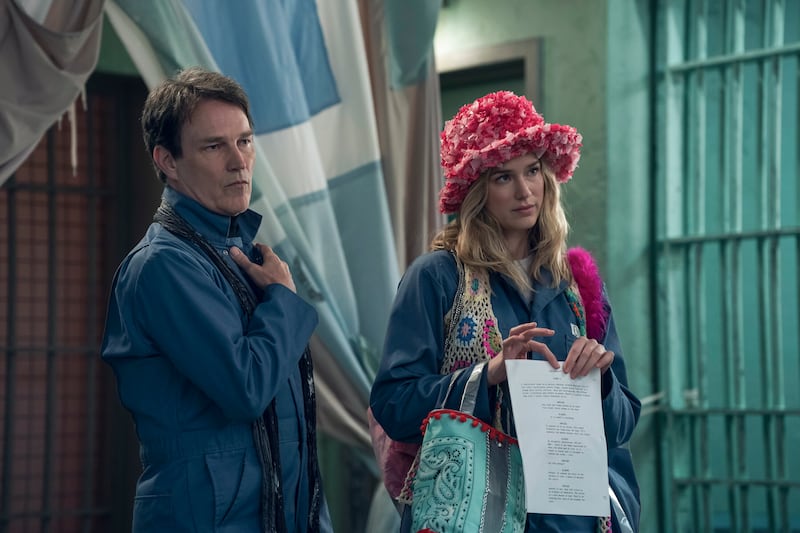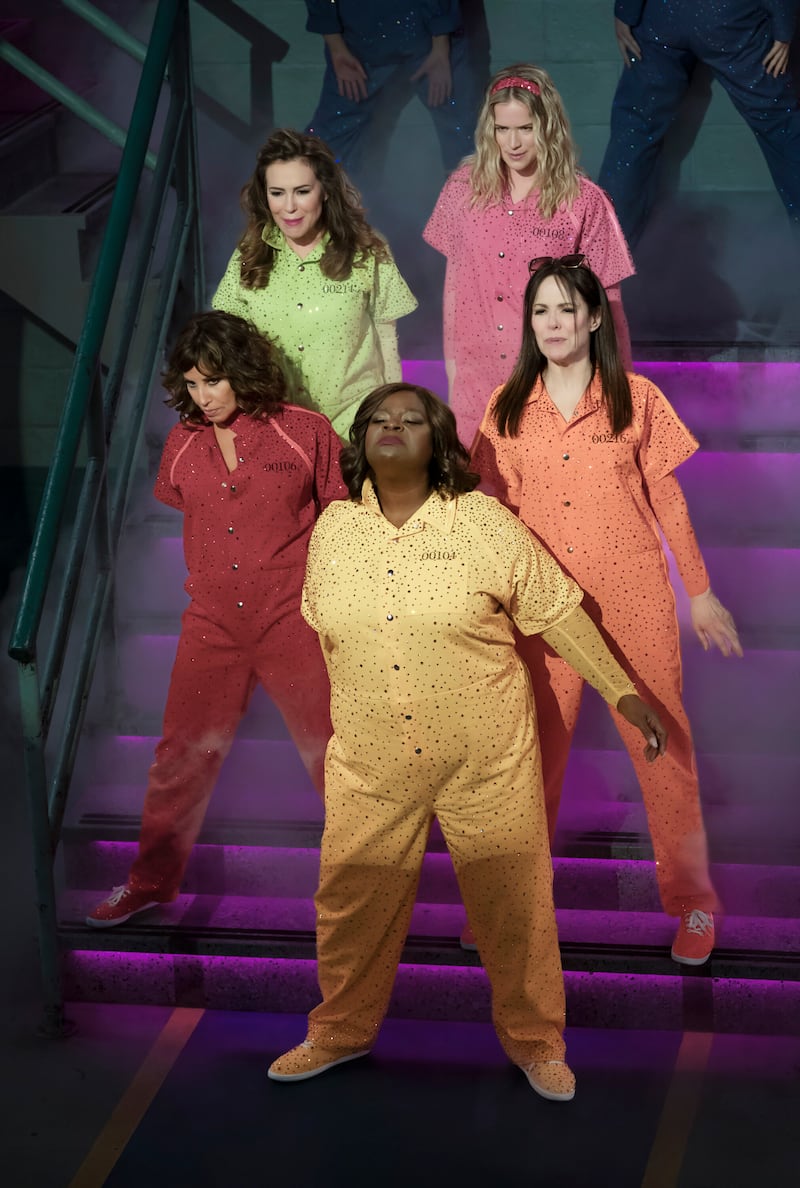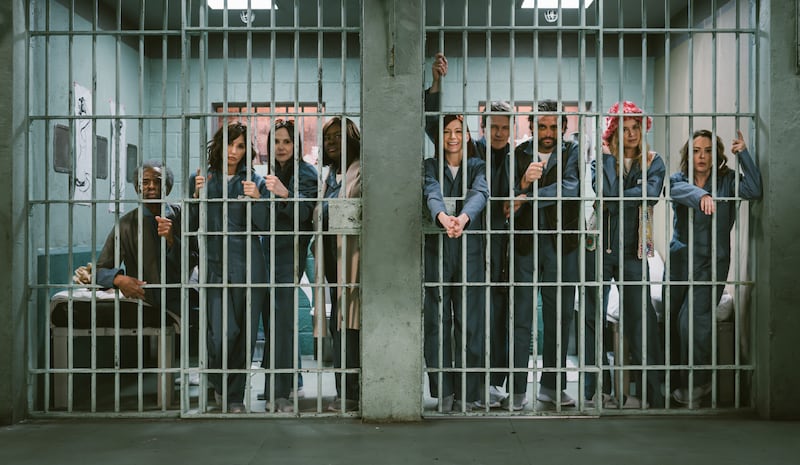There are few comforts as reliable as the TV procedural.
As television has moved more and more toward serialization, the pleasures of episodic storytelling have become all the more precious. It’s no surprise that audiences have gravitated toward series like Elsbeth and High Potential, and turned older shows like Suits into streaming success stories.
The world outside is chaotic, to put it mildly—we’ve been living in some version of “uncertain times” for at least the last five years—and it’s tough to deny the relief that comes from tuning into a weekly show and knowing exactly what to expect.
Elsbeth is a comfort show on a couple levels. First, because it rarely deviates from its “howcatchem” format, in which viewers see a murder take place and then watch Elsbeth (Carrie Preston) solve it. And second, because its title character maintains a level of good-natured optimism that seems downright inexplicable for a woman solving crimes in New York City.
(Warning: Elsbeth season finale spoilers ahead.)
In the final episodes of the show’s second season, however, that consistency found itself under threat. Elsbeth’s attempts to bring corrupt Judge Milton Crawford (Michael Emerson) to justice fail repeatedly—until, in “I Know What You Did Thirty-Three Summers Ago,” she witnesses him gunned down in front of her. The traumatic event punctures her cheerful outlook and forces her to confront the reality that some stories don’t wrap up cleanly, a less-than-comforting notion.
“She’s someone who really wants to be positive and wants to see the good in things, and that’s been shaken,” Preston tells The Daily Beast’s Obsessed. “She is willfully trying to find the light. And so she does that with the work—that’s how she gets through her life. Meanwhile, all of these things keep happening that challenge that.”
It’s not only Judge Crawford’s assassination, something Elsbeth considers the wrong kind of justice. It’s also her best friend and work wife Detective Kaya Blanke (Carra Patterson) accepting a job doing undercover work that will force the previously inseparable pair apart. And in Season 2’s penultimate episode, Elsbeth struggles to prove that rich kid Rod Bedford (Billy Magnussen) is guilty of murder. By the end of “I’ve Got a Little List,” she’s been sent to a detention center after being arrested for harassment.

In the final scene, she crumbles in tears to Kaya and Captain Wagner (Wendell Pierce). “I’ve been in such a dark place lately, which is so weird for me,” she tells them. “I mean, it’s not that weird, but it’s weird for me to show it.”
For Preston, who has played Elsbeth Tascioni for 15 years, beginning with her debut in a 2010 episode of The Good Wife, the breakdown was a long time coming. She also knows it’s not something easy for an audience who has come to appreciate Elsbeth’s bubbly attitude. “That was really fun to play, but it was also, I know, hard to watch by design,” she says. “We don’t want to see this sunny character in this darker place.”
Mercifully, the season finale is a return to form for the character and the show. The situation looks grim for Elsbeth at the start, as she suddenly finds herself in jail alongside a number of killers she helped put away throughout the show’s first two seasons. It’s a murderers’ row of, well, murderers—not to mention an opportunity to bring back notable guest stars like Gina Gershon, Mary-Louise Parker, Alyssa Milano, and Retta—all of whom blame Elsbeth (somewhat fairly) for their incarceration.

But once the show’s very first killer, Stephen Moyer‘s sleazy director Alex Modarian from the pilot, ends up murdered, the situation shifts. Elsbeth thrives when she’s in investigation mode, and she has a genuinely great rapport with these criminals, a credit to Preston’s ability to build chemistry with every guest star and to the character’s sincere interest in her suspects.
“That’s one of her superpowers,” Preston notes. “She’s able to be empathic and compassionate with people who’ve done horrible things. That’s how she figures out how and why and what happened to make this person want to murder somebody, so she can bring them to justice. She can have this respect and empathy for these people, at the same time that she is repelled by their actions.”

The brilliant “Cell Block Tango” fantasy sequence, in which Elsbeth imagines various potential murderers confessing to the crime, helps bring joy back to the series. But it’s Elsbeth nailing the culprit—not a returning guest star, but Donna Lynne Champlin‘s prison warden Mama Martin (in case you needed another Chicago allusion)—that seems to lift the character from the depths of her sorrow.
“As soon as there’s a murder case, it just gives her everything that she needs to find her mojo again,” Preston reflects. “It really does inject her with just what she needs to kind of jolt herself back out of this darker place that she’s been in.”
It’s a relief that Elsbeth‘s second season ends on a more upbeat note after dabbling in darkness. But the arc of the last three episodes feels like a deliberate acknowledgment of the real world, as much as the series has tried to be a reprieve from it. It’s hard to separate Elsbeth’s doubts about justice from headlines that underline rich and powerful people continuing to get away with flagrantly illegal acts.
When Elsbeth toasts Kaya’s departure in the finale by saying “the truth always matters,” it sounds like a rallying cry. It could also be read as a rebuke of a presidential administration that operates with its own set of facts and creative interpretation of the law.
Preston doubts the series will ever be as overtly political as its predecessors—The Good Wife spin-off The Good Fight, on which Preston also appeared, was particularly Trump-centric—but she acknowledges that the show is responding, in broad strokes, to the bigger picture.

“We’re not ignoring the real world that we all live in,” she says. “We’re not picking sides, but we’re not pretending like we live in a world where justice is always served and everything’s fair and balanced.”
It’s a fine line to walk for a show that ultimately wants to be comfort viewing, and the finale—in which a number of theatrical vets get to sing and dance—is a reminder that Elsbeth‘s primary goal is to entertain. “I feel a great responsibility in us delighting people and not getting too heavy-handed with the politics,” Preston shares.
At the same time, the end of the show’s second season presents a sort of path forward for anyone feeling the pull of hopelessness. As Elsbeth’s portrayer points out, the character’s is a “daily practice.” She hopes that Elsbeth’s ability to bounce back—not by ignoring reality, but by pursuing justice despite the odds—is “inspiring and infectious” to viewers who might be experiencing a similar despair.
By the end of the season, Elsbeth has come as close as it ever has to leaving the audience with a moral: not that justice is always served, but that it’s essential to keep trying.
“The truth matters, and the point is to try to pursue it, even if you don’t always get it,” Preston says. “Sometimes when you’re faced with a lot of things that feel out of your control, the default mode is to just give up or be apathetic or complacent. That’s not what these characters are about. And I love that. I think it’s galvanizing.”









